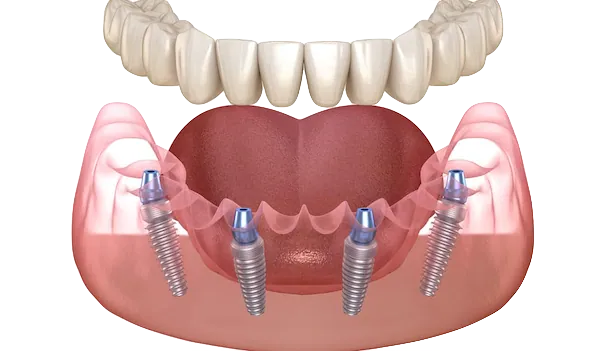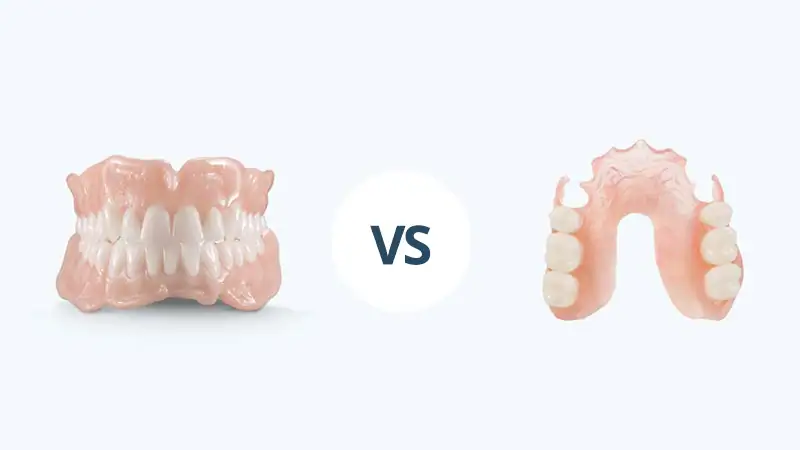Do full and partial dentures provide an effective solution for missing teeth?
If you have missing teeth or are facing tooth extraction, you may have already received a lot of information about dentures, which are often viewed as the default solution. However, this narrow perspective has caused many people to overlook alternative options. Instead of exploring the best solution for their missing teeth, they simply default to dentures. As a result, they may ask questions such as the one below.
What’s the difference between full dentures and partial dentures?
To be honest, dentures are not our preferred option due to the many people who have experienced dissatisfaction with them. They may restrict what you can eat and cause concerns about teeth falling out.
However, we value being transparent and providing information, so we’ll answer your question: what is the difference between full dentures and partial dentures? We believe it’s important for you to be aware of all your options before making a decision, so you can determine what is best for your individual needs.
Dentures vs. partials: understand their differences
If you’re considering dentures, it may be due to tooth loss from an injury or disease. This can make it difficult to speak, chew properly, or feel confident about your smile. Additionally, missing teeth can alter the shape of your face, further impacting your self-esteem.
With this in mind, you may be wondering about your options for dentures.
Full dentures
Full or complete dentures are designed to replace an entire set of upper or lower teeth, or both. Typically, these dentures are crafted from acrylic or plastic, with the base intended to resemble your natural gums.
This base rests directly on your gums and should fit snugly to prevent movement. False teeth, which closely resemble your natural teeth, are positioned within the gum-colored plastic and are responsible for biting and chewing food. However, it can take several months to adjust to using your new teeth.
Full dentures for upper teeth come with a plate that covers the entire roof of your mouth, which can be quite sizable and uncomfortable for those with a strong gag reflex. Unfortunately, our brains can sometimes view dentures as foreign objects that need to be expelled, leading to gagging.
Both upper and lower dentures can slip out of place, even with the use of denture glue. This problem is especially common with lower dentures, which rely on gravity and cheek muscles to stay in place.
The issues of gagging and slippage associated with dentures can lead to further complications, including difficulties with speech. Speaking with dentures can be a challenging task, especially when they feel foreign and bulky in your mouth or move around while you’re talking. These concerns can be anxiety-inducing and make for an exhausting experience.
Partial dentures
Partial dentures, as the name implies, are designed to cover only a section of your mouth. They are a popular choice for individuals who have healthy teeth or are missing only a few teeth.
Partial dentures are usually crafted from the same materials as full dentures and are custom-fitted to your mouth to provide a snug fit. These dentures rely on the neighboring teeth for support and attachment.
Similarities between full and partial dentures
Both full dentures and partial dentures have similarities:
- they are crafted from similar materials;
- they replace missing teeth;
- they can both lead to bone loss.
It’s important to note that bone loss can occur wherever teeth are missing, and dentures are used as replacements. This can cause changes to the shape of your mouth and result in an ill-fitting denture over time.
Your best choice
We strongly advise against getting full or partial dentures as they are not the safest or healthiest option for replacing missing teeth. Both can lead to bone loss and an unstable bite. Instead, we recommend dental implants as a secure and permanent solution. Dental implants are firmly attached to your jaw bone, preventing slipping and even helping to stimulate bone growth.

If you are missing one or two teeth, a single or partial dental implant may be sufficient. However, we also offer full mouth dental implants for those missing all their teeth. With Dental & Implant Centers Of Colorado’s permanent teeth in 24 hours, you can have your permanent dental implants in just 24 hours.
To make an informed decision before opting for dentures, we encourage you to schedule a personal consultation with us. If dental visits make you nervous, don’t worry as we don’t perform any invasive procedures. Instead, we conduct a non-invasive CT scan and provide you with all the available options for replacing your missing teeth.
To initiate the process, schedule your free consultation. We are eager to discuss your options with you!
So, before you make any hasty decisions like extracting your teeth or opting for quick fixes that may result in bone loss, please get in touch with us. Our goal is to inform you and guide you towards a decision that you feel fully confident about when it comes to replacing your missing teeth.




